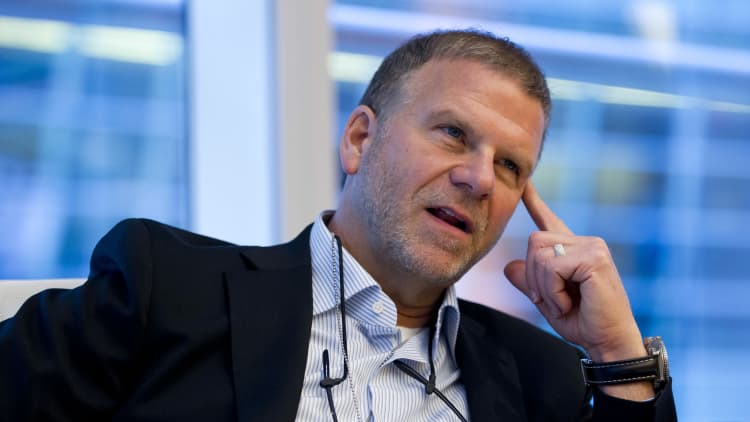In the past 20 years of my career, I've run many global teams at Fortune 500 companies. I know what it's like to be the only female executive in the room.
Today, I coach CEOs at businesses ranging from startups to multimillion-dollar global corporations. And from what I've observed, no one takes the time to explain the "unwritten rules" of business and what it takes to get to the top.
Here's one thing I wish more people did early in their careers: Learn how to nurture and navigate professional relationships.
The 3 relationships you need to advance your career
Networking is a lot more complex than you might think.
Between my colleagues, clients and friends, I have seen too many early- and mid-career workers hit a professional wall because they don't understand the three most important types of relationships: mentors, advocates, and sponsors.
Each has a distinct role:
- A mentor offers you counsel and advice, often based on their advanced experience. They don't need to be in your organization, but they should be able to offer insights into how you can be more successful at work.
- An advocate speaks in support of your work and talent, often informally. They may be a former manager who confirms your strong leadership skills, or a colleague who nudges a manager to consider you for a promotion.
- A sponsor is typically senior and has strong organizational power. They put their own reputation on the line to vouch for you. Sponsors generally work at your current company or at a company you'd like to work for.
Many organizations have mentorship programs, but never a sponsorship program — even though I believe having a sponsor is the most important professional connection you can have.
That means it's on you to find your own sponsors.
Why having a sponsor is important
Anyone who is on the short list to be hired for a role is qualified. But what happens when three equally qualified people are competing for the same job? Often, the chosen person had a sponsor who made a strong case for them.
I've seen the impact of having a sponsor in my own career. Over a decade ago, I was being considered for a managing director promotion at a global software company, where I'd be overseeing a $100 million business unit with more than 150 employees.
The final decision came down to me and one other person. We were both equally qualified, but had very different skills.
While my competitor had a mentor to guide her through the interview process, I had a senior executive who sponsored me. He essentially said: "I will put my reputation on the line to vouch for Liz. I am confident that she is the top person for the job."
I got the job, and I exceeded expectations. More importantly, my sponsor ensured that my compensation was equitable to the other managing directors, who were all male.
In one 2019 study by Payscale, Inc., people who had a sponsor were paid 11.6% more than those who did not, because sponsors are often the ones making pay and promotion decisions.
How to find sponsors at work
Finding sponsors can take trial and error. Starting to build meaningful relationships early on means more time to identify and network with the right people. Here are four ways to get started:
1. Make a list.
Think of everyone you know — friends, family, colleagues, teachers. Label each person as mentor, advocate or sponsor. Then update the list once a month.
Understanding which relationships can fulfill which roles in your life helps you know where to invest your time and energy. Sometimes, mentors or advocates will turn into sponsors as your relationships deepen and they become more familiar with your work.
2. Invest in your colleagues.
Former colleagues are some of our strongest potential sponsors, as they have direct insight into your skills. Get to know your colleagues better. Invite them to coffee or lunch. Even some bantering at the beginning of a meeting can pay off.
The best relationships are built on genuine connection. Ask people about their lives outside of work, and share with them stories of your own. Always be authentic and kind over being political.
3. Join organizations focused on topics you love.
Growing your network can happen outside of the office, too.
The organizations you join do not need to be work-related — they just need to give you the opportunity to genuinely connect with others. You never know who you'll meet!
4. Give back.
The most effective professional relationships are mutually beneficial. When you're asking for mentorship, advocacy or sponsorship from someone, think about what you can offer them.
Whether it's insight into a different market, an introduction or advice of your own, you must have something to give in return.
Liz Taxin Nemiroff is the founder and CEO of Yellow Brick Advisors, where she helps investors and senior executives accelerate growth and drive scale. Previously, Liz spent a decade in senior management roles at Thomson Reuters. Liz started her career as an investment banker and strategy consultant at Merrill Lynch & Co., American Express and S&P Global. She holds an MBA from Harvard Business School and a B.A. from Harvard College.
Don't miss:
- A 69-year-old founder of a billion-dollar company says adding this one word to his negative thoughts ‘changed my life’
- An Amazon applicant who Jeff Bezos hired ‘on the spot’ shares 5 ways to ‘instantly impress’ during the job interview
- A Harvard-trained economist shares his top 21 money rules: ‘Own your home’ and ‘try to buy in cash’



